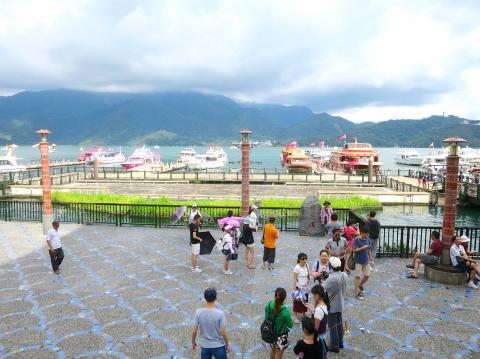The Executive Yuan has approved a plan to extend NT$30 billion (US$952 million) in loans to the tourism sector, which has felt the pinch after a fall in the number of Chinese visitors this year.
The Cabinet said that the loans are aimed at helping domestic tourism businesses upgrade their hardware and software in a bid to improve the quality of the industry and eventually attract more visitors to the nation.
Since the Democratic Progressive Party government took office on May 20, there has been a 30 percent year-on-year decline in the number of Chinese tourists taking part in group tours amid cooling cross-strait ties.

Photo: Liu Pin-chuan, Taipei Times
The number of Chinese visitors was down 15.03 percent year-on-year in July, after falling about 12 percent in May and June.
According to the Hotel Association of the Republic of China (Taiwan), the hotel occupancy rate has dropped by 50 percent, with those in central, southern and eastern Taiwan the hardest-hit.
In addition, the National Joint Association of Buses for Tourists of the Republic of China (Taiwan) said that about 80 percent of a total of 16,000 tourist buses in the nation are idle.
The plunge has caused an outcry from the tourism industry, which has urged the government to provide financial assistance to help companies survive the steep decline.
Members of the tourism industry are planning to stage a demonstration on Monday.
The loans are to be made available to businesses under set circumstances defined by the National Development Council, Executive Yuan spokesman Tung Chen-yuan (童振源) said, adding that the loans are not a form of financial relief.
According to the council’s Guiding Principles on Preferential Loans to Aid the Upgrades of the Tourism Industry (獎勵觀光產業升級優惠貸款要點), companies applying for the loans must use the funding to upgrade their hardware and software to offer better quality tourism.
The Executive Yuan said it would also encourage more Taiwanese to tour the nation and make up for the shortfall in Chinese visitors, while the government would continue in its efforts to diversify the sources of foreign visitors.
The Executive Yuan said that it would help the tourism industry come up with innovative tour packages providing an insightful look at the nation, including its unique cultures, to lure more foreign tourists.
Additional reporting by Lee Hsin-fang

Right-wing political scientist Laura Fernandez on Sunday won Costa Rica’s presidential election by a landslide, after promising to crack down on rising violence linked to the cocaine trade. Fernandez’s nearest rival, economist Alvaro Ramos, conceded defeat as results showed the ruling party far exceeding the threshold of 40 percent needed to avoid a runoff. With 94 percent of polling stations counted, the political heir of outgoing Costa Rican President Rodrigo Chaves had captured 48.3 percent of the vote compared with Ramos’ 33.4 percent, the Supreme Electoral Tribunal said. As soon as the first results were announced, members of Fernandez’s Sovereign People’s Party

EMERGING FIELDS: The Chinese president said that the two countries would explore cooperation in green technology, the digital economy and artificial intelligence Chinese President Xi Jinping (習近平) yesterday called for an “equal and orderly multipolar world” in the face of “unilateral bullying,” in an apparent jab at the US. Xi was speaking during talks in Beijing with Uruguayan President Yamandu Orsi, the first South American leader to visit China since US special forces captured then-Venezuelan president Nicolas Maduro last month — an operation that Beijing condemned as a violation of sovereignty. Orsi follows a slew of leaders to have visited China seeking to boost ties with the world’s second-largest economy to hedge against US President Donald Trump’s increasingly unpredictable administration. “The international situation is fraught

MORE RESPONSIBILITY: Draftees would be expected to fight alongside professional soldiers, likely requiring the transformation of some training brigades into combat units The armed forces are to start incorporating new conscripts into combined arms brigades this year to enhance combat readiness, the Executive Yuan’s latest policy report said. The new policy would affect Taiwanese men entering the military for their compulsory service, which was extended to one year under reforms by then-president Tsai Ing-wen (蔡英文) in 2022. The conscripts would be trained to operate machine guns, uncrewed aerial vehicles, anti-tank guided missile launchers and Stinger air defense systems, the report said, adding that the basic training would be lengthened to eight weeks. After basic training, conscripts would be sorted into infantry battalions that would take

GROWING AMBITIONS: The scale and tempo of the operations show that the Strait has become the core theater for China to expand its security interests, the report said Chinese military aircraft incursions around Taiwan have surged nearly 15-fold over the past five years, according to a report released yesterday by the Democratic Progressive Party’s (DPP) Department of China Affairs. Sorties in the Taiwan Strait were previously irregular, totaling 380 in 2020, but have since evolved into routine operations, the report showed. “This demonstrates that the Taiwan Strait has become both the starting point and testing ground for Beijing’s expansionist ambitions,” it said. Driven by military expansionism, China is systematically pursuing actions aimed at altering the regional “status quo,” the department said, adding that Taiwan represents the most critical link in China’s